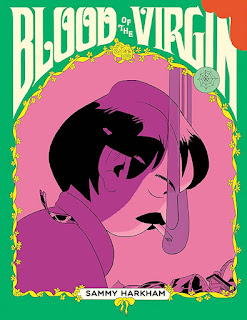Sammy Harkham's Blood of the Virgin is a major literary graphic novel: it does all of the things expected of the genre, and does them well. It has a novelistic heft and scope, even including very loosely related flashbacks to earlier people and times. There may be something slightly obvious about it: it does hew really closely to the conventions of its genre. But it's a strong entry in that genre, a book that has a good version of the core story to tell and that tells its story with energy, passion, and a precise eye. More importantly, it's not a genre that comes up all that often in comics to begin with, so it looks fresher and more exciting as it is that it would have as a movie or a prose novel.
Seymour edits movie trailers for a cheapie horror-movie production company; it's the fall of 1971. He's twenty-seven; he's had this job three years; he's ambitious in the sense that he loves movies - unabashedly loves horror movies - and that he wants to keep doing them, to get closer to the core of filmmaking. I don't know if he has grandiose artistic visions that he wants to see on screen; I get the sense that, at this point, he has changes he wants to ring on established ideas and that his ideas will keep iterating, keep developing, as he works and learns and gets better.
Assuming he gets those opportunities. Assuming he takes them and does well.
He's written a script - "Blood of the Virgin" is his title, of course. There's a hole in the company's schedule that script can slot into. As usual with a business like that, the hole is right now. Seymour has to finish the script immediately, and then dive into being one of the on-set producers for that movie, during the hectic three weeks it films. All of that is a big opportunity, a chance to move up in the business, to get public credits and be part of something real. But it's also a hell of a lot of frantic, demanding work, right now.
Time is money. Nowhere more so than the movie business. Nowhere more so than in marginal, low-budget businesses.
Harkham gives a great view of the contingent, improvisational, scrambling nature of low-budget filmmaking: Blood of the Virgin is about a lot of things, but central to most of them is what it's like to make a movie. To be in a location for that day, chasing shots, wrangling actors, fighting with effects, tracking time as the sun inexorably chases across the sky. Planning and strategizing, directors and producers and moguls and assistants, figuring out what they need and what they can get done and what might need to be abandoned. (And "what" always includes "who.") The big parties afterward, where everyone goes a little crazy, where they all mix more freely. We see all of those scenes, different times during the course of the creation of this movie, as Seymour tries to handle his new responsibilities and to do them the ways he thinks movies should be made.
Meanwhile, his marriage is...well, I don't want to overstate it. In the annals of literary-fiction marriages, Seymour and Ida are pretty good. They snap at each other angrily only some of the time; they talk past each other only as much as any couple does. They have real affection for each other, when there's time around hectic movie shoots and a demanding baby. They fuck other people for the usual literary-story reasons, but not often, and pretty far into the book. They are not "doomed" in any way: they can get through this if they want to.
Harkham here is putting it all on the page; this is a big story stuffed with ideas and characters and insights and ideas. There are pages jammed with panels, filled with dialogue, and pages of long quiet late-night drives - it's set in LA, so freeways are at least a minor character. It's a hugely ambitious book that largely lives up to its ambitions: there are probably a half-dozen themes I haven't even touched on here. It's a big book, a rich one, that tells its story well and has a big, compelling story to tell. It is literary fiction, and we can use more of that in comics: the ambition, the depth, the scope.

No comments:
Post a Comment